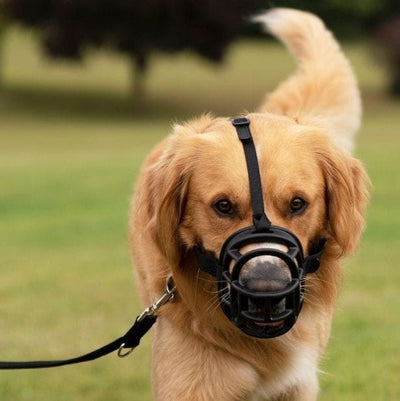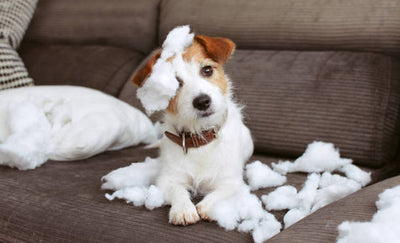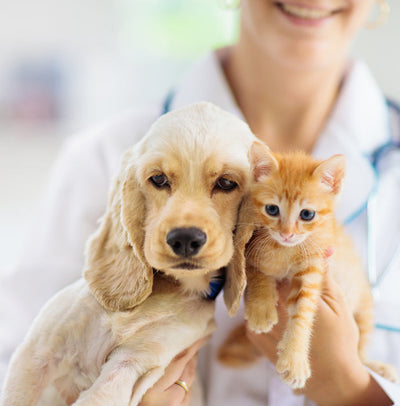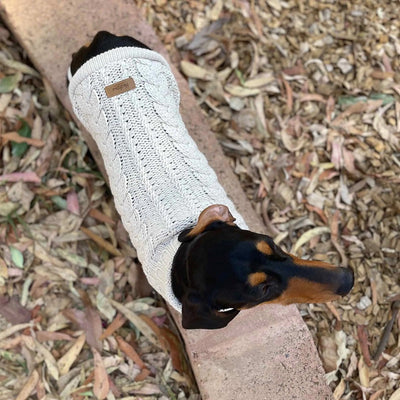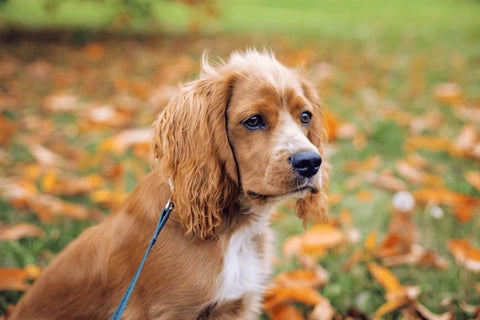
Are you looking for a furry companion with a combination of charm, intelligence, and affection? Look no further than the Cockerlier, the perfect blend of two beloved breeds: the Cocker Spaniel and the Cavalier King Charles Spaniel. Sometimes known as Cockaliers and Covockers, in Australia, the breed is more commonly known as Cockerliers.
Cockerliers possess a unique and enchanting mix of characteristics that make them a favorite among dog lovers. With their adorable faces framed by long, luscious ears and expressive eyes, these pups are impossible to resist.
Known for their friendly and sociable nature, Cockerliers make excellent family pets and are great with children and other animals. They thrive on companionship and are eager to please, making training a breeze.
Both the Cocker Spaniel and the Cavalier King Charles Spaniel are known for their intelligence and loyalty, qualities that are passed down to their Cockerlier offspring. These pups are quick learners and respond well to positive reinforcement techniques.
Whether you're looking for a playmate for your children, a running partner, or simply a best friend, a Cockerlier could be the perfect addition to your home. With their irresistible personalities and stunning looks, it's no wonder these captivating canines are stealing hearts around the world.
The history and origin of Cockerliers
The Cockerlier is a relatively new breed that began gaining popularity in the early 2000s. To understand the history and origin of Cockerliers, we must delve into the backgrounds of their parent breeds, the Cocker Spaniel and the Cavalier King Charles Spaniel.
The Cocker Spaniel originated in Spain and was bred for hunting small game. They were prized for their ability to flush out birds and retrieve them from both land and water. Over time, Cocker Spaniels made their way to England, where they were further developed into the breed we know today. With their affectionate and loyal nature, Cocker Spaniels quickly became popular as family companions.
The Cavalier King Charles Spaniel, on the other hand, has a regal history that dates back to the 17th century. Named after King Charles II, these spaniels were highly favored by royalty and nobility. They were often seen lounging in the laps of their owners, providing comfort and companionship. Cavalier King Charles Spaniels are known for their gentle and affectionate nature, as well as their stunning, silky coats.
The Cockerlier combines the best traits of both parent breeds, resulting in a delightful and versatile companion. This breed has gained popularity for its charming looks and friendly personality.
Physical characteristics of Cockerliers
One of the most striking features of a Cockerlier is its adorable face. With their large, expressive eyes and long, luscious ears, these pups are sure to melt your heart. Cockerliers have a compact and well-proportioned body, with a medium-sized frame. They typically weigh between 5-15kg and stand around 30-40cm tall at the withers (shoulder).
Cockerliers can inherit a range of coat colours and patterns from their Cocker Spaniel and Cavalier King Charles Spaniel parents. These can include solid colours such as black, brown, or white, as well as parti-colours, roans, and merles. Their coats are usually medium to long in length and require regular grooming to keep them looking their best.
In addition to their beautiful coats, Cockerliers have a friendly and alert expression that can instantly capture your attention. Their wagging tails and overall happy demeanor make them a joy to be around. Whether they are playing with children, going for a walk in the park, or simply lounging at home, Cockerliers are always ready for an adventure.
Temperament and personality traits of Cockerliers
Cockerliers are known for their outgoing and friendly nature. They are social dogs that enjoy being around people and other animals. Their gentle and loving disposition makes them excellent family pets, and they are particularly great with children. Cockerliers have a natural affinity for kids and are patient and tolerant, even when subjected to the enthusiastic play of little ones.
These intelligent and eager-to-please dogs are quick learners and respond well to positive reinforcement techniques. Training a Cockerlier can be a fun and rewarding experience, as they thrive on praise and rewards. They are known to be adaptable and can excel in various activities, such as obedience, agility, and even therapy work.
Cockerliers are not typically aggressive and are more likely to greet strangers with a wagging tail than with suspicion. However, proper socialisation from an early age is essential to ensure that they grow up to be well-rounded and confident dogs. This can involve exposing them to different people, animals, and environments, as well as providing them with positive experiences.
It is important to note that each Cockerlier may have its own unique temperament, influenced by factors such as genetics and early socialisation. However, in general, Cockerliers are known for their affectionate, playful, and loyal nature. They form strong bonds with their families and are always eager to shower them with love and attention.
Caring for Cockerliers - grooming, exercise, and nutrition
Cockerliers have a moderately high grooming requirement due to their long, silky coats. Regular brushing is essential to prevent matting and keep their fur looking its best. It is also important to check and clean their ears regularly, as their long ears are prone to infections. Additionally, maintaining good dental hygiene by brushing their teeth regularly can help prevent dental issues later in life.
As for exercise, Cockerliers are active dogs that require daily physical activity to keep them happy and healthy. Daily walks, playtime in the yard, and interactive toys can provide the mental and physical stimulation they need. They also enjoy activities such as swimming, going for walks, and participating in dog agility. However, it's important to remember that Cockerliers are not high-energy dogs like some other breeds, so moderate exercise is usually sufficient.
When it comes to nutrition, providing a balanced and high-quality diet is crucial for the overall health and well-being of your Cockerlier. Consult with your veterinarian to determine the appropriate portion sizes and the best type of food for your dog's age, size, and activity level. It is important to monitor their weight and adjust their diet accordingly to prevent obesity, which can lead to various health problems.
Training and socialisation tips for Cockerliers
Training a Cockerlier can be a delightful experience, thanks to their intelligence and eagerness to please. Positive reinforcement techniques, such as praise, treats, and rewards, work exceptionally well with these dogs. They respond best to gentle and consistent training methods, as harsh or forceful techniques can lead to fear or anxiety.
Early socialisation is crucial for Cockerliers to develop into well-rounded and confident dogs. Expose them to different people, animals, sounds, and environments from a young age. This will help them become comfortable and adaptable in various situations. Enrolling them in puppy classes or obedience training can also provide structured socialisation opportunities and help strengthen the bond between you and your Cockerlier.
Consistency is key when it comes to training a Cockerlier. Establishing clear rules and boundaries from the beginning will help prevent any unwanted behaviours. Use positive reinforcement to reward good behavior and redirect or ignore undesirable behavior. Patience, consistency, and positive reinforcement will go a long way in shaping your Cockerlier into a well-behaved and obedient companion.
Common health issues in Cockerliers
Like all dog breeds, Cockerliers may be prone to certain health issues. It is important to be aware of these potential concerns and take appropriate measures to keep your Cockerlier healthy and happy. Some common health issues that may affect Cockerliers include:
- Ear Infections: Cockerliers have long, droopy ears that can trap moisture and debris, making them prone to ear infections. Regular cleaning and proper ear care can help prevent these issues.
- Eye Problems: Both Cocker Spaniels and Cavalier King Charles Spaniels are prone to certain eye problems, such as cataracts and progressive retinal atrophy (PRA). Regular eye check-ups and proper care can help monitor and manage these conditions.
- Heart Disease: Cavalier King Charles Spaniels are known to be predisposed to heart conditions, such as mitral valve disease. Regular veterinary check-ups and a healthy lifestyle can help detect and manage any potential heart issues.
- Hip Dysplasia: This is a common condition in many dog breeds, including Cockerliers. It is a hereditary condition that affects the hip joints and can cause discomfort or lameness. Regular exercise, a balanced diet, and maintaining a healthy weight can help minimise the risk of hip dysplasia.
To ensure the overall health and well-being of your Cockerlier, it is important to schedule regular veterinary check-ups, maintain a balanced diet, provide regular exercise, and address any health concerns promptly.
Cockerliers for sale in NSW
When looking to add a Cockerlier to your family, it is essential to find a responsible organisation. When you purchase a puppy from us, we provide you with the following guarantees to make sure that you find the perfect match!
- Comprehensive vet checks
- All our puppies are microchipped and come with a 7 day cooling off period
- Free accident and injury pet insurance is included for 30 days
- De sexing bond
- Have a lifetime rehoming program
- Up-to-date vaccination, worming and parasite protection
- 7 day health guarantee (conditions apply)
- Support and follow up for your new pup
Our team can answer any questions and provide ongoing support and guidance for all pups.
Frequently asked questions about Cockerliers
- Are Cockerliers hypoallergenic?Cockerliers are not considered hypoallergenic dogs. They have a moderate shedding coat that requires regular grooming to minimize shedding. However, no dog breed is completely hypoallergenic, as allergies can vary from person to person.
- How much exercise do Cockerliers need?Cockerliers are moderately active dogs that require daily exercise to keep them physically and mentally stimulated. A combination of daily walks, playtime, and interactive toys should be sufficient to meet their exercise needs.
- Are Cockerliers good with children?Yes, Cockerliers are known for their friendly and gentle nature, making them great companions for children. They are patient and tolerant, even with the energetic play of little ones.
- Do Cockerliers get along with other pets?Cockerliers are generally sociable and get along well with other animals when properly introduced and socialised from a young age. Early socialisation can help them develop positive relationships with other pets in the household.
- How long do Cockerliers live?On average, Cockerliers have a lifespan of around 12 to 15 years. Providing them with proper care, nutrition, and regular veterinary check-ups can help ensure a long and healthy life.
Is a Cockerlier the right dog for you?
Cockerliers truly are a delightful combination of the Cocker Spaniel and the Cavalier King Charles Spaniel. With their charming looks, friendly personality, and intelligence, they make wonderful family pets and companions. Whether you're looking for a playmate for your children, a running partner, or simply a best friend, a Cockerlier could be the perfect addition to your home.
However, it is important to consider your lifestyle, time commitment, and ability to provide proper care and attention before bringing a Cockerlier into your life. They require regular grooming, exercise, and socialisation to thrive.
If you're ready for a loving and loyal companion who will bring joy and laughter to your life, a Cockerlier may just be the perfect fit for you. With their irresistible personalities and stunning looks, these captivating canines are sure to steal your heart and become a cherished member of your family.
© weknowpets 2024


